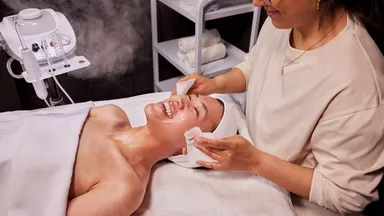
How Much Should Spa Managers and Owners Make?
Last updated: June 23, 2025
The spa industry is expected to reach a market value of $156.1 billion by 2027. According to ClassPass' 2023 Look Back Report, 78% of consumers believe that wellness is more important than ever, making spa services a valuable resource for relaxation, promoting health, and enhancing beauty. As the demand for spa services increases, so does the need for skilled professionals to manage and own these businesses.
Understanding industry standards around spa compensation is necessary to ensure fair pay, whether you're new to the field or hiring staff for your spa. Keep reading to learn more about spa managers' and owners' roles, skills, qualifications, and compensation.
What do spa managers do?
A spa manager or spa owner oversees various aspects of the spa's operations. While their duties vary depending on the size and type of spa, general responsibilities include ensuring that processes and operations run smoothly and that customers receive quality services. Spa managers may also be responsible for recruiting, hiring and training employees, inventory management, facility management, and hitting revenue and expense targets. Below is a breakdown of typical responsibilities by spa type.
Hotel and resort spas
As part of a larger business, managers or directors in these types of hotel spas have more targeted responsibilities. Since they can rely on the resort for sales, marketing and engineering support, these roles are more corporate in nature. It is not uncommon for a spa at a hotel or resort to have 75-100 people on staff and be open for longer than normal hours which necessitates a layered management structure. Spa managers in these organizations need the ability to lead and delegate to a larger team and financial literacy to be able to manage a budget.
Mid-sized spas and wellness centers
In a mid-sized spa or wellness center with approximately 25 to 50 employees, this leadership role may be referred to as a spa director or spa operations manager. The individual in this position will be responsible for achieving revenue and expense targets, ensuring the facility is fully staffed with motivated and well-trained employees, and maintaining the physical location. Additionally, they may be required to contribute to marketing campaigns and concepts and generate creative promotional ideas.
Local day spas
A local day spa, which typically has 12 to 30 employees and four to eight treatment rooms, is easier to manage than a larger spa, by virtue of its smaller size and scope. Many day spas are owner-operated, and that owner usually handles legal, financial, and strategic matters—the spa manager in this case oversees daily operations such as opening and closing the spa, scheduling staff, managing inventory, providing customer service, and improving staff morale. This type of business often sees a regular clientele base, so it is important for management staff to be visible and to cultivate relationships with guests and the local community.
Spa manager skills and qualifications
The role of a spa manager requires a combination of skills, experience, and, in some cases, education. Spa managers typically have a background in hospitality, business management, or a related field. A business or hospitality management degree or a spa management certificate can also be beneficial for excelling in this position. While spa managers do not need experience as a service provider to be successful, it doesn't hurt for them to have an in-depth understanding of their staff's responsibilities.
While formal education lays a healthy foundation, soft skills such as attention to detail, organization, customer service, and communication are also valuable. Hard skills in marketing, accounting, management, and finance can also be advantageous for spa manager success. Possessing these skills can enable spa managers to effectively lead teams, oversee back-office tasks, provide excellent customer service, manage day-to-day operations, and ultimately grow the business.
Spa manager salary
The average spa manager salary in the US is $75,407 per year, according to Glassdoor. However, this figure can vary widely based on years of experience, skills, company size, location, and industry. Earning potential will also be based on overall responsibilities, number of people managed, and volume of revenue. Small day spa managers outside of major urban centers typically earn between $40-$50k, while spa directors at large hotels may have a low six-figure salary. The specific industry segment and geographical location also play crucial roles in determining compensation, with managers in high-demand or affluent areas often receiving higher pay. Additionally, overall job market conditions can also influence salary levels.
Spa managers may receive benefits in addition to their base salary, including bonus potential. Paid time off (PTO) is standard in this position, with at least one week off after the first year and two weeks off after three or more years. A health care plan, if available, is a strong incentive for prospective managers, especially those from retail or hospitality backgrounds. Bonuses for spa managers can vary but generally should be tied to hitting revenue and expense targets and offer the opportunity to add 5% to 10% to the base salary.
Spa owner salary
Spa owners have the potential to earn more than salaried managers, but their income depends heavily on the success of the business. On average, a spa owner makes $89,691, with those owning highly successful and well-established spas possibly earning up to $200,000 annually. Unlike managers, spa owners' earnings are directly tied to the profits remaining after all expenses are paid. This means their income can vary greatly depending on the spa's location, reputation, size, and the range of services offered.
In some cases, owners perform all management duties and should compensate themselves accordingly. Owners need to consider whether they work in the business, providing treatments and services, or on the business, focusing on management and oversight. Being a spa owner comes with significant financial risks and responsibilities, including initial startup costs, ongoing operational expenses, staff retainment, and the continuous need to attract new clients.
Understanding earnings in the spa industry
Remember that spa manager and owner positions require a unique blend of skills, qualifications, and experience to thrive in this competitive industry. Spa managers ensure smooth day-to-day operations and customer satisfaction. However, spa owners bear the financial duties, risks, and rewards of business ownership and need to enjoy the challenges of entrepreneurship.
Whether you aim to become a spa manager or own your own business, it's essential to understand each role's financial and professional requirements. Pursuing the required education, gaining experience, and acquiring industry knowledge are crucial. A good grasp of the compensation landscape will enable you to make informed decisions as you progress in your career.



